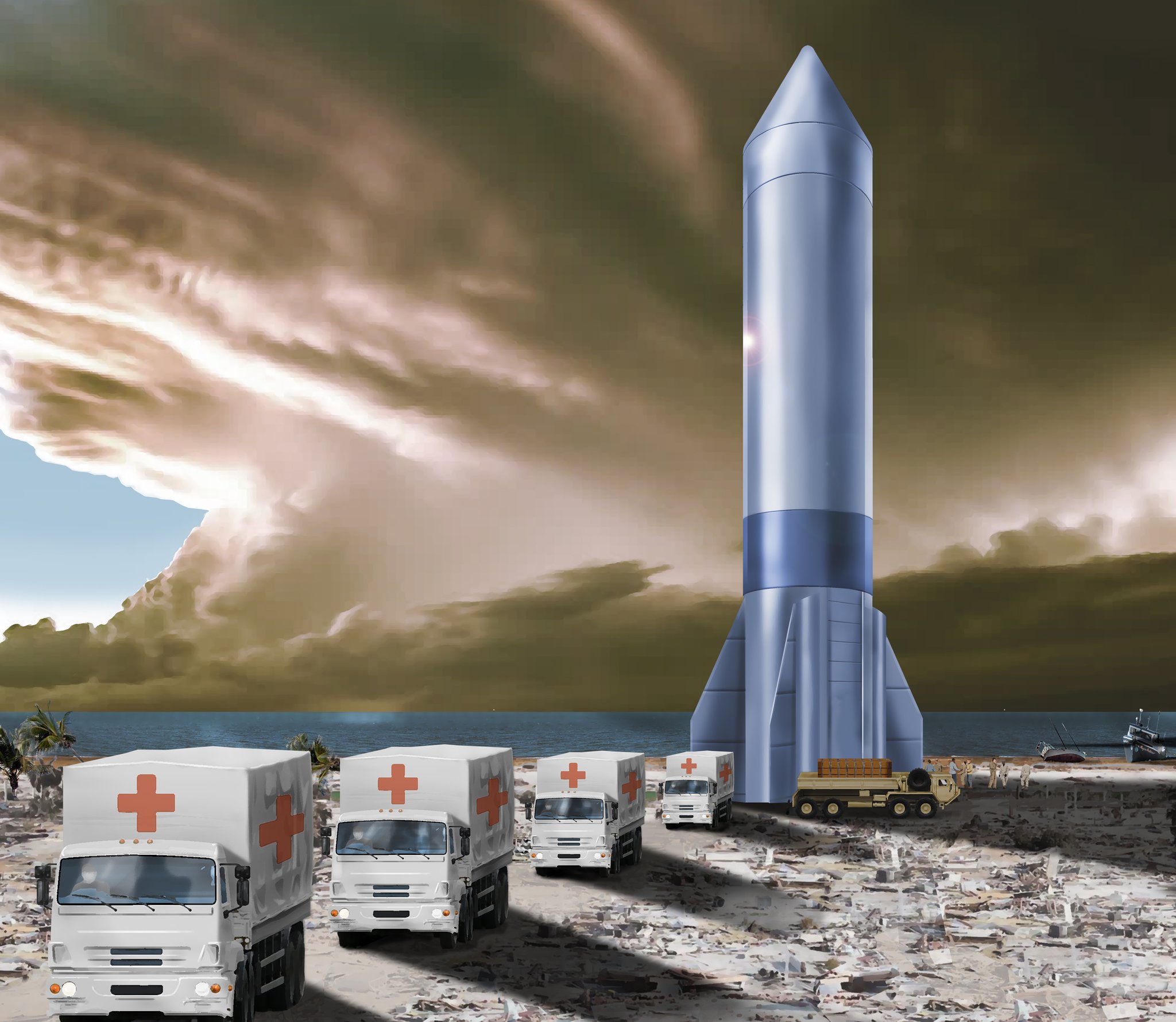US Air Force wants a commercial Rocket Cargo Vanguard to fly stuff anywhere on Earth
The new program is studying concepts to fly up to 100 tons of cargo around the planet.

The U.S. Air Force launched a new rocket cargo program with the Space Force Friday (June 4) to study the use of commercial spacecraft to ship supplies around the world — and they may look to NASA's lunar lander program for ideas.
If the project, called Rocket Cargo, goes as planned, it would take advantage of a swiftly growing rocket industry competing to send satellites into space. While the search for rocket companies has just begun, a concept released by the U.S. Air Force Research Laboratory (AFRL) evokes the sleek, silver Starship prototypes being tested by SpaceX in South Texas.
In the past decade, newer industry entrants such as SpaceX, Relativity Space and Rocket Lab — fueled by new efficiencies in rocket manufacturing, self-landing stages and increased demand for CubeSats — are rising to compete with industry standbys such as Arianespace and United Launch Alliance.
These "new opportunities," Space Force and Air Force officials said in a joint statement, are "expanding cargo capacity and dramatically reducing launch costs." The military branch therefore plans to examine how to use the largest available commercial rockets to ship dozens of tons of supplies around the world, especially to remote areas.
"Once realized, Rocket Cargo will fundamentally alter the rapid logistics landscape, connecting materiel to joint warfighters in a fraction of the time it takes today," John "Jay" Raymond, Space Force chief of space operations, said in the statement. "In the event of conflict or humanitarian crisis, the Space Force will be able to provide our national leadership with an independent option to achieve strategic objectives from space."
This project would potentially be a large opportunity for participating companies. The USAF's fiscal 2022 budget includes $47.9 million for rocket cargo, according to SpaceNews, as the military seeks ways to put cargo containers onto rockets that can carry 30 to 100 tons. The advantage over conventional airplanes such as the C-17 is the ability to fly supplies to remote areas in 90 minutes instead of in hours or days.
Officials said in a press conference that they plan to open solicitations "in the very near future," according to SpaceNews. SpaceX isn't the only company under consideration, but the military declined to give any other names. One possibility for alternatives, officials added, could be companies that are seeking moon landing opportunities under NASA's Commercial Lunar Payload Services (CLPS) program.
Get the Space.com Newsletter
Breaking space news, the latest updates on rocket launches, skywatching events and more!
That could include quite a few companies, if NASA's website is an indication. Selected CLPS providers for landers so far include Astrobotic Technology, Blue Origin, Ceres Robotics, Draper, Firefly Aerospace, Intuitive Machines, Lockheed Martin Space, Masten Space Systems, Moon Express, Orbit Beyond, Sierra Nevada Corporation, SpaceX and Tyvak Nano-Satellite Systems.
NASA has picked SpaceX's Starship vehicle to land astronauts on the moon as part of its Artemis program. Blue Origin, which has developed a suborbital reusable rocket called New Shepard, and another company, Dynetics, also submitted bids and are protesting the SpaceX award.
Rocket Cargo would see commercial companies developing the new rockets while the military would "primarily invest in the S&T [science and technology] needed to quickly adapt the capability" for Department of Defense missions, the military release said. The defense department would also be the first customer, procuring missions through service leases.
The companies would be working closely with several military organizations. The AFRL will lead science and technology development, Space Force will act as lead service and the Space and Missile Systems Center will be program executive officer, the Air Force statement.
Rocket Cargo is the fourth Vanguard program by the U.S. military seeking "transformational" items for the Department of the Air Force's decadal science and technology strategy, the release added. The other three programs focus on autonomous aerial platforms, autonomous networked weapons, and space-based positioning, navigation and timing.
Follow Elizabeth Howell on Twitter @howellspace. Follow us on Twitter @Spacedotcom and on Facebook.
Join our Space Forums to keep talking space on the latest missions, night sky and more! And if you have a news tip, correction or comment, let us know at: community@space.com.

Elizabeth Howell (she/her), Ph.D., was a staff writer in the spaceflight channel between 2022 and 2024 specializing in Canadian space news. She was contributing writer for Space.com for 10 years from 2012 to 2024. Elizabeth's reporting includes multiple exclusives with the White House, leading world coverage about a lost-and-found space tomato on the International Space Station, witnessing five human spaceflight launches on two continents, flying parabolic, working inside a spacesuit, and participating in a simulated Mars mission. Her latest book, "Why Am I Taller?" (ECW Press, 2022) is co-written with astronaut Dave Williams.









